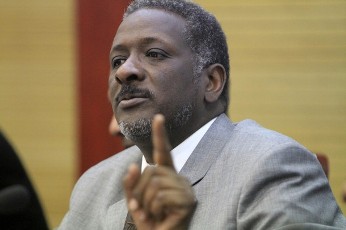Sudanese government approves 2013 draft budget, says no lifting of fuel subsidies
December 3, 2012 (KHARTOUM) – The Sudanese finance minister Ali Mahmood on Monday denied any intention to further cut fuel subsidies next year and ruled out the possibility of increasing wages despite intense pressure by the labor union.

“If we increased wages, this would require lifting subsidies on commodities and fuel,” he told reporters.
Today’s meeting called for the establishment of a committee to study the issue of raising wages in general and the minimum wage in particular. The findings are to be presented before the end of 2013’s first quarter.
The minister said that the 2013 budget projects 25.2 billion Sudanese pounds (SDG) in revenues and 35.0 billion SDG in expenses leaving a deficit of 10 billion SDG ($1.5 billion) which equals 3.4% of the country’s Gross Domestic Product (GDP).
He added that exports are expected to reach $4.5 billion in 2013 compared to $3.8 billion last year with imports at $7.2 billion bringing trade deficit to $2.7 billion.
The official complained that consumption of petroleum products has increased and said he expects fuel subsidies to reach $4.8 billion this year compared to $2.5 billion in 2011.
Overall the budget targets 3.4% economic growth, inflation rate of 20% compared to 45% in October, deficit at 3.4% of GDP, exchange rate flexibility while reducing imports and increasing exports.
Mahmood said that Sudan’s oil production will hit150,000 barrels per day (bpd) from 115,000 bringing $300 million in revenues.
Gold exports reached between 47 and 48 tonnes by November and were expected to rise above 50 tonnes annually, bringing in more than $2 billion a year, he added.
The budget however will not reflect last September’s oil deal with landlocked South Sudan by which Khartoum would receive a cut from every barrel of oil exported by Juba.
South Sudan was meant to resume oil production on Nov. 15 with the first exports to hit markets by January.
But recent hurdles that emerged as a result of Khartoum’s insistence that security arrangements are agreed on with Juba before oil can start flowing again.
Since the secession of the oil-rich south in July 2011, Sudan has suffered an economic shock causing a sharp drop in revenues and flow of hard currency coupled with deteriorating exchange rate and soaring inflation levels.
Oil now accounts for 3-5% of Sudan’s GDP, down from around 15% , while providing a much-reduced 20-25% of revenue, the International Monetary Fund (IMF) said in a recent report.
This year Sudan adopted an austerity package partially lifting fuel and sugar subsidies as well as curtailing number of federal and state ministries to rein in spending. It also raised certain taxes and devalued the currency in a bid to bring parity with black market rate.
The IMF welcomed the austerity package but called on Khartoum to enhance tax policy and revenue administration “by reducing tax exemptions and improving tax compliance”. It also urged the East African nation ” to pursue the phasing-out of subsidies and develop a well targeted safety net system. It also recommends imposing a profit tax on gold producers as the sector develops”.
The IMF said that Sudan’s GDP is projected to shrink by -11.1% this year and -0.6% in 2013.
(ST)
